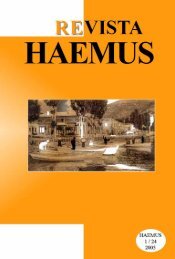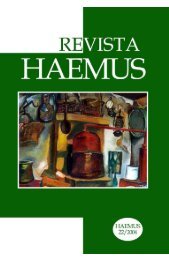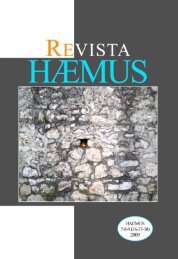- Page 2 and 3: HÆMUS Revistë evropiane * Revist
- Page 4 and 5: Përmbajtje / Cuprins Fjalori / Dic
- Page 6 and 7: FREDERIK RESHPJA në italisht nga A
- Page 8: URA LIDHËSE / PUNŢI DE LEGĂTURĂ
- Page 11 and 12: altuia, al modului său de gândire
- Page 13 and 14: PERLA ALI PODRIMJA Poet de referin
- Page 15 and 16: ARIAN LEKA Poet, prozator, editor
- Page 17 and 18: PËRSIATJE / CUGETARE ARDIAN-CHRIST
- Page 19 and 20: vetëm sepse jeta e njeriut është
- Page 21 and 22: emra hyjnish, mbretërish, qytezash
- Page 23 and 24: Ata hanë verë të kuqe, të gurë
- Page 25 and 26: ndryshme. Një peshk i ndritshëm n
- Page 27 and 28: AVOKATI YT / AVOCATUL TĂU Smira (C
- Page 29 and 30: Prania e shqiptarëve në Rumani li
- Page 31 and 32: „Që më një të kollozhekut / u
- Page 33 and 34: Në zgjedhjet parlamentare të nën
- Page 35 and 36: DIONIS QIRZIDHI Zemra më qan gjak
- Page 37 and 38: Lindjes, me një korpus të madh ve
- Page 39 and 40: me një fe për të mbajtur gjakun,
- Page 41 and 42: Vetëm fatlumtura shpalosi me gjith
- Page 43 and 44: EVENIMENT Kosova e pavarur Është
- Page 45: AUDACES FORTUNA JUVAT 30 Ai që rrn
- Page 49 and 50: two hooded partisans shouted down t
- Page 51 and 52: was forced into exile. He found asy
- Page 53 and 54: PARNASSÓS LASGUSH PORADECI Poet al
- Page 55 and 56: PAUL VINICIUS (Rumani) Historia e n
- Page 57 and 58: dhe bëhet shtatë-tetë-nënte fem
- Page 59 and 60: në qiell mbi ne nuk ishin të miat
- Page 61 and 62: nga erdhi kjo punë: vallë të më
- Page 63 and 64: s’u tund nga mushkëria e tij e d
- Page 65 and 66: ION MUREŞAN (Rumani) Poema për po
- Page 67 and 68: Kurse nën tavan, duke kujisur vent
- Page 69 and 70: PËR TË QESHUR E PËR TË QARË DE
- Page 71 and 72: shpirti i saj i pakorrigjueshëm i
- Page 73 and 74: Artistat e partisë dhe artistat e
- Page 75 and 76: Comisia europeană adoptase deja,
- Page 77 and 78: Parlamentul European, statele membr
- Page 79 and 80: • Îmbunătăţirea educaţiei ci
- Page 81 and 82: utiliza noile canale de comunicare,
- Page 83 and 84: Cartea Albă a comunicării europen
- Page 85 and 86: LABIRINTET E SHKENCËS LABIRINTURIL
- Page 87 and 88: companiei şi se află în strâns
- Page 89 and 90: directă, la obiect, sau poate fi o
- Page 91 and 92: vizează spaţiul de comunicare şi
- Page 93 and 94: fi asigurat de contactele permanent
- Page 95 and 96: O barieră importantă în calea co
- Page 97 and 98:
Ja fragmenti kryesor i mitit i sjel
- Page 99 and 100:
kryqin te shtylla ku do ta mbërthe
- Page 101 and 102:
KRENAR ZEJNO 35 Na ishte se ç’na
- Page 103 and 104:
Ja tek na dëfton edhe ky (idhull i
- Page 105 and 106:
IULIA NĂNĂU 36 Identitate scrisă
- Page 107 and 108:
imaginea prezentată de teoriile na
- Page 109 and 110:
fireşte la un animal dăunător, c
- Page 111 and 112:
Prehje Po prehem në kolltukun e zv
- Page 113 and 114:
Nji jetë e preme përgjysmë, Kujt
- Page 115 and 116:
Ningea Dar urmele nu fură acoperit
- Page 117 and 118:
MIJËVJETSHI I URTISË MILENIUL ÎN
- Page 119 and 120:
testi principali di riferimento, qu
- Page 121 and 122:
Revista Haemus: Forse Vostra Eccell
- Page 123 and 124:
Revista Haemus: Il Papa Giovanni Pa
- Page 125 and 126:
l’apparato, è determinante per d
- Page 127 and 128:
Monsignor Jean-Claude Périsset: Il
- Page 129 and 130:
În acest cadru, lângă conceperea
- Page 131 and 132:
acest context, nu trebuie să uită
- Page 133 and 134:
gülüm”, “Söz gümüşse, sü
- Page 135 and 136:
ümitle beklemekteyiz. Arnavutluk h
- Page 137 and 138:
“Bizler kimsenin düşmanı deği
- Page 139 and 140:
anashkaluar nga regjisorët tanë k
- Page 141 and 142:
tilla të paharruara dhe unë kam k
- Page 143 and 144:
nga ata nuk i ktheu përgjigje. At
- Page 145 and 146:
DIXIT MONSINJOR VLADIMIR GJIKA Nës
- Page 147 and 148:
Kur magjia e zezë i merr vendin mr
- Page 149 and 150:
Të mendojmë Zotin - rruga më e m
- Page 151 and 152:
CÆLESTIS ARCUS 1ST DECLARATION OF
- Page 153 and 154:
February 2006. Whilst progress was
- Page 155 and 156:
QYTETE / ORAŞE Bucharest Bucharest
- Page 157 and 158:
THEATRUM KOPI KYÇYKU O privire în
- Page 159 and 160:
personajele, ele sunt acolo, în ma
- Page 161 and 162:
Balzac şi Zola în operele lor. Dr
- Page 163 and 164:
Personajele ies în faţa noastră
- Page 165 and 166:
Ambiguitatea este parte constitutiv
- Page 167 and 168:
afective şi psihologice, pe care l
- Page 169 and 170:
neaşteptate, jocul mut capătă su
- Page 171 and 172:
OAZI I PËRKTHYESIT OAZA TRADUCĂTO
- Page 173 and 174:
pentru viaţa celei de-a patra suro
- Page 175 and 176:
cu mulţi ani mai târziu, în curs
- Page 177 and 178:
Di tamburi e luna, rattristato. Ah,
- Page 179 and 180:
LUOGO NATIO DELLA MAMMA Lassù la l
- Page 181 and 182:
por vetëm njerëzve më të ngritu
- Page 183 and 184:
që vazhdoj ta kem. Sporti asht shu
- Page 185 and 186:
gazetarinë nuk e due. Jo pse dysho
- Page 187 and 188:
KRENAR ZEJNO Dy vargje për vargun
- Page 189 and 190:
* * * Sot, pas çastit që ndërkal
- Page 191 and 192:
Prezenca ESTHER JANSMA Ku është k
- Page 193 and 194:
(ne: sup më sup, pa ngutësi, një
- Page 195 and 196:
Ti rri ulur mbi tavolinë. Papritur
- Page 197 and 198:
să-mi atrag norii: părul de prin
- Page 199 and 200:
steagurile albe pe care le vede ca
- Page 201 and 202:
Dincolo de orice logică nu sunt v
- Page 203 and 204:
ALARMI HAEMUS ALARMA HÆMUS Terror
- Page 205 and 206:
(AUTO)PORTRET Nëse ke vendosur (!)
- Page 207 and 208:
Revista Haemus: Në kohën kur boto
- Page 209 and 210:
fshehtë - veti që mbrujtin fatth
- Page 211 and 212:
64 Për nderim. - lat. AB HONORES 6
- Page 213 and 214:
212 këngëzim s’e quajnë, poezi
- Page 215 and 216:
Avrupa “bënte plane” të përt
- Page 217 and 218:
eshtrat ilirikë fosilizohen në kr
- Page 219 and 220:
ndërsa gjaku, njollat e kuqe… nu
- Page 221 and 222:
12 - wigwam - një lloj kolibe në
- Page 223 and 224:
do të ofrojë zërin e tij të nd
- Page 225 and 226:
KOMBET NË EVROPË NEAMURILE ÎN EU
- Page 227 and 228:
Sorin Chelmu tregon draftin e një
- Page 229 and 230:
Në kohën që isha në Rumani në
- Page 231 and 232:
Kartmonedhat futeshin nga një vend
- Page 233 and 234:
direkte me investitorët të huaj i
- Page 235 and 236:
ăzboinicii de atunci nu se gândea
- Page 237 and 238:
mod sistematic drepturile omului, a
- Page 239 and 240:
La 19 mai 1919, este iniţiată o m
- Page 241 and 242:
îndeaproape pe arabi, are convinge
- Page 243 and 244:
nimicite, iar armata revoluţionar
- Page 245 and 246:
Măsura desfiinţării Sultanatului
- Page 247 and 248:
Cultului Islamic şi al Fundaţiilo
- Page 249 and 250:
arheologice, care, după îndelungi
- Page 251 and 252:
Përmbledhja me poezi në gjuhën p
- Page 253 and 254:
dalë në pah. Studimi nga speciali
- Page 255 and 256:
osmane. Jo thjesht si gjuhë për t
- Page 257 and 258:
preferencat e veta për greqishten,
- Page 259 and 260:
kërkova një stilolaps fqinjëve,
- Page 261 and 262:
eros”). Pra, Naimi pas greqishtes
- Page 263 and 264:
ishte ai shqiptar. Bash në këto
- Page 265 and 266:
Ndërsa në Stamboll s’është ç
- Page 267 and 268:
Tematika personale paraqet vetëm n
- Page 269 and 270:
E kështu leximi i tekstit vazhdon
- Page 271 and 272:
6. Zejnullah Rrahmani:Teoritë letr
- Page 273 and 274:
popujt e ndajnë mesveti ashtu siç
- Page 275 and 276:
ka dëgjuar thirrjen e Zotit, - do
- Page 277 and 278:
vëllimin “Mendime për rrjedhën
- Page 279 and 280:
Monsinjori zgjidhet të përballë
- Page 281 and 282:
mendime të diskutueshme; gjërat e
- Page 283 and 284:
vdekje. Ata pandehin se vdekja ka p
- Page 285 and 286:
explicit sau implicit, de omogeniza
- Page 287 and 288:
De altfel, marele istoric Nicolae I
- Page 289 and 290:
îngheţata, braga, produsele de co
- Page 291 and 292:
nerecunoscând minoritatea aromân
- Page 293 and 294:
comunist din România între anii 1
- Page 295 and 296:
SCRIPTA MANENT ANTON ÇEFA Sistemi
- Page 297 and 298:
mënyrë organike udhëtimin prej S
- Page 299 and 300:
BAHTIE GËRBESHI ZYLFIU 87 Gratë n
- Page 301 and 302:
Athenaeus numron gati 3000 hetere,
- Page 303 and 304:
Në perëndim, sipas Meri Franko-La
- Page 305 and 306:
Gjithashtu me rëndësi është edh
- Page 307 and 308:
evropian Kristo Sotiri; romanin „
- Page 309 and 310:
vëllezërve Sami e Naim Frashëri,
- Page 311 and 312:
Si nuk u ngopët shqimit!" ËNDRRA
- Page 313 and 314:
Rri zgjuar sonte në kët' natë t
- Page 315 and 316:
AGIMIN QË NUK E PE Nënës Qielli
- Page 317 and 318:
ISUF SHERIFI Rrëfimi për Gurët d
- Page 319 and 320:
mbin në lulishte, edhe njeriu nës
- Page 321 and 322:
Të falenderoj, O Zot, për bukën
- Page 323 and 324:
u përgjigj, kërsiti përsëri e p
- Page 325 and 326:
Re araboberbere I afërmi i mikut t
- Page 327 and 328:
ndjerit u rreshtuan lart shkallëve
- Page 329 and 330:
nëpër plazh, emocion, hezitim i p
- Page 331 and 332:
fyti iu shket mbi tehun e çeliktë
- Page 333 and 334:
"paspatin", siç e thërrasin në t
- Page 335 and 336:
të llozhrave, nën tavolinat e ndr
- Page 337 and 338:
Personalisht si poet, çfarë jeni
- Page 339 and 340:
shpie, nën çatinë e njëjtë të
- Page 341 and 342:
dalë nga ai që është i ditur. J
- Page 343 and 344:
diferite organe de specialitate din
- Page 345 and 346:
espectiv arhitectura sistemului com
- Page 347 and 348:
Gëzimi është ai që fisnikëron
- Page 349 and 350:
Bucuria e reflexul psihic al purei
- Page 351 and 352:
E VËRTETA - BIJA E KOHËS ADEVĂRU
- Page 353 and 354:
njihte nga koha e kaluar bashkë n
- Page 355 and 356:
parë Colosseo-n, Tour Eiffel-in, A
- Page 357 and 358:
shfaqen të natyrshme, nuk do t’i
- Page 359 and 360:
Karl Marx ka pasur për poezinë dh
- Page 361 and 362:
variant i dytë më i zgjeruar. Ky
- Page 363 and 364:
Ândrra për t'u bërë futbollist
- Page 365 and 366:
dikë që desh të arratisej me not
- Page 367 and 368:
me kokë zyrave apo kafeneve të bu
- Page 369 and 370:
kujtime jo shumë të largëta, kur
- Page 371 and 372:
ushtri me kukullat tona, do vërë
- Page 373 and 374:
Toate acestea parcă le-am acum în
- Page 375 and 376:
I-am întins mâna. - Tu eşti D’
- Page 377 and 378:
- Vei fi şi tu printre noi, D’Ar
- Page 379 and 380:
În acele spectacole făcuse cunoş
- Page 381 and 382:
Domnişorica s-a uitat la mine blâ
- Page 383 and 384:
- Drăguţe domnişoare (cine poate
- Page 385 and 386:
gratë që dashurojmë janë liqene
- Page 387 and 388:
na kallëzojnë miqësisht - drejt
- Page 389 and 390:
kohë, atje, krejt i palëvizshëm,
- Page 391 and 392:
luftëtarë i lirisë, i bukur si g
- Page 393 and 394:
kafshët, vinte në gjumë dragoin
- Page 395 and 396:
Mbrëmja u bë e errët. Xixëllonj
- Page 397 and 398:
Mjeku nuk e mori vesh kurrë lidhje
- Page 399 and 400:
DUO Çasti i parjes dhe i reflektim
- Page 401 and 402:
egjistruar edhe drejtimin Letërsi
- Page 403 and 404:
edhe periferitë diktatoriale, por
- Page 405 and 406:
Riat Ajazaj: Takimi i parë me Shqi
- Page 407 and 408:
BIBLIOTHÆCA HÆMUS Një roman befa
- Page 409 and 410:
Ndonëse togfjalëshi ‘estetika e
- Page 411 and 412:
ëhet një ndërmjetësues i vlefsh
- Page 413 and 414:
Në parathënien e librit „Algjer
- Page 415 and 416:
exclud eventualitatea existenţei u
- Page 417 and 418:
Poezia shqipe pati një zhvillim tr
- Page 419 and 420:
atdhetë mes të cilëve je lindur
- Page 421 and 422:
U dynd vdekja dhe gëlltitur mbet n
- Page 423 and 424:
sepse drama kosovare dhe mbarëshqi
- Page 425 and 426:
e sidomos ankesën, duke rishpirtë
- Page 427 and 428:
PENA QË S’U THYEN CONDEIE CARE N
- Page 429 and 430:
Şi noi mergem Râzând când plân
- Page 431 and 432:
„prieteni de odinioară“ îi nu
- Page 433 and 434:
BIS REPETITA PLACENT 108 Jehona e n
- Page 435 and 436:
TEKAT E TRANZICIONIT TOANELE TRANZI
- Page 437 and 438:
pllaqi, të shtypur, budallaqe, të
- Page 439 and 440:
ARTE BAJRAM SEFAJ Një njeri, sa nj
- Page 441 and 442:
pagesë në atë restorant, duke ia
- Page 443 and 444:
ndonjë instrument tjetër muzikor.
- Page 445 and 446:
Nehat Islami drejtor i gazetës «R
- Page 447 and 448:
një brinjë. Kur martohesh thyhen
- Page 449 and 450:
Sigurisht mes shumë qyteteve, vizi
- Page 451 and 452:
Fusca dhe në botim të Grafosud, k
- Page 453 and 454:
“Ngjyra është muzikë” Bised
- Page 455 and 456:
desh, si jo pak të tjerëve, ta ri
- Page 457 and 458:
Revista Haemus: Çfarë vizatove, a
- Page 459 and 460:
lumească îmi aparţine, ea reapri
- Page 461 and 462:
GEORGE ISTRATE Njeriu i ndërprerë
- Page 463:
I PALINDURI: Cili jam unë përderi





